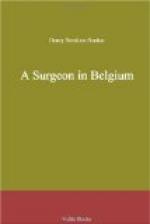It was our great regret that we had so little time in which to see the work of the Antwerp hospitals, but we made use of what opportunities we had. There are many of them, and those we saw were magnificent buildings, equipped in a way which filled us with envy. The great city hospital, the Stuivenberg, was a model of what a modern hospital ought to be. The wards were large and airy and spotlessly clean, and the nurses seemed to be extremely competent. The kitchens were equipped with all the latest appliances, steam boilers, and gas and electric cookers. But the show part of the hospital was the suite of operating theatres. I have always felt the pardonable pride of a son in the theatres of the London Hospital, but they were certainly eclipsed here. Each theatre was equipped with its own anaesthetizing room, its own surgeon’s room, and its own sterilizing rooms and stores, all furnished with a lavishness beyond the financial capacity of any hospital in London. Perhaps some of the equipment was unnecessary, but it was abundantly evident that the State appreciated the value of first-class surgery, and that it was prepared to pay for it. I have never heard the same accusation levelled at Great Britain.
At St. Camille we had the good fortune to see M. Xambotte at work. His reputation as a surgeon is worldwide, and it was pleasant to find that his dexterity as an operator was equal to his reputation. It is not always the case. He is an expert mechanic, and himself makes most of the very ingenious instruments which he uses. He was fixing a fractured femur with silver wires, and one could see the skilled workman in all that he did. There is no training-ground for one’s hands like a carpenter’s bench, and the embryo surgeon might do much worse with his time than spend six months of it in a workshop. When medical training emerges from its medieval traditions, manual training will certainly form a part, and no one will be allowed to attempt to mend a bone till he has shown his capacity to mend a chair-leg. Here, again, the surgeon was surrounded by all the appliances, and even the luxuries, that he could desire. The lot of the great surgeon abroad is indeed a happy one.
But there is one thing in which we in England are far better off—in our nursing staffs. In most of the hospitals we visited the nursing was carried on by Sisterhoods, and though some of them were evidently good nurses, most of them had no idea whatever of nursing as it is practised in our country. Fresh air, for example, is to them full of dangers. One would almost think that it savoured of the powers of evil. We went into one huge hospital of the most modern type, and equipped lavishly, and such wag the atmosphere that in ten minutes I had to make a rush for the door. One large ward was full of wounded soldiers, many of them with terrible wounds, gangrenous and horrible, and every window was tightly shut. How they could live in such an atmosphere is beyond my comprehension, but the Sisters did not seem to notice it at all.




